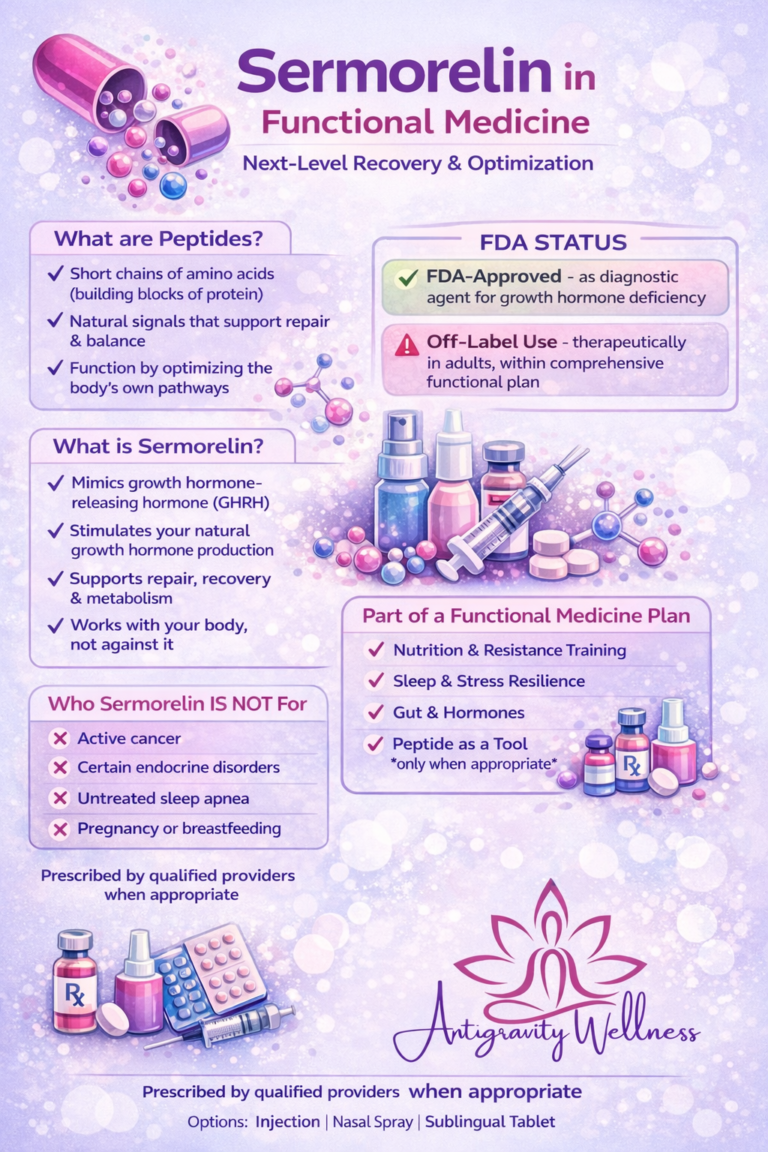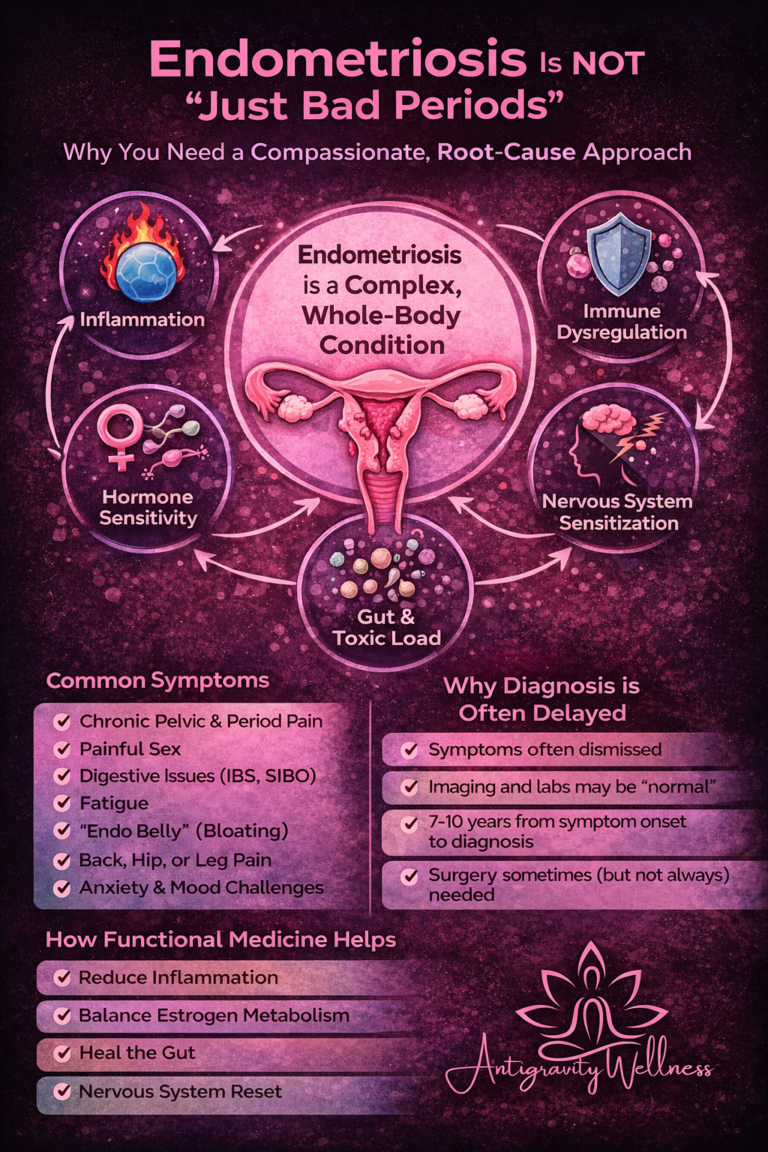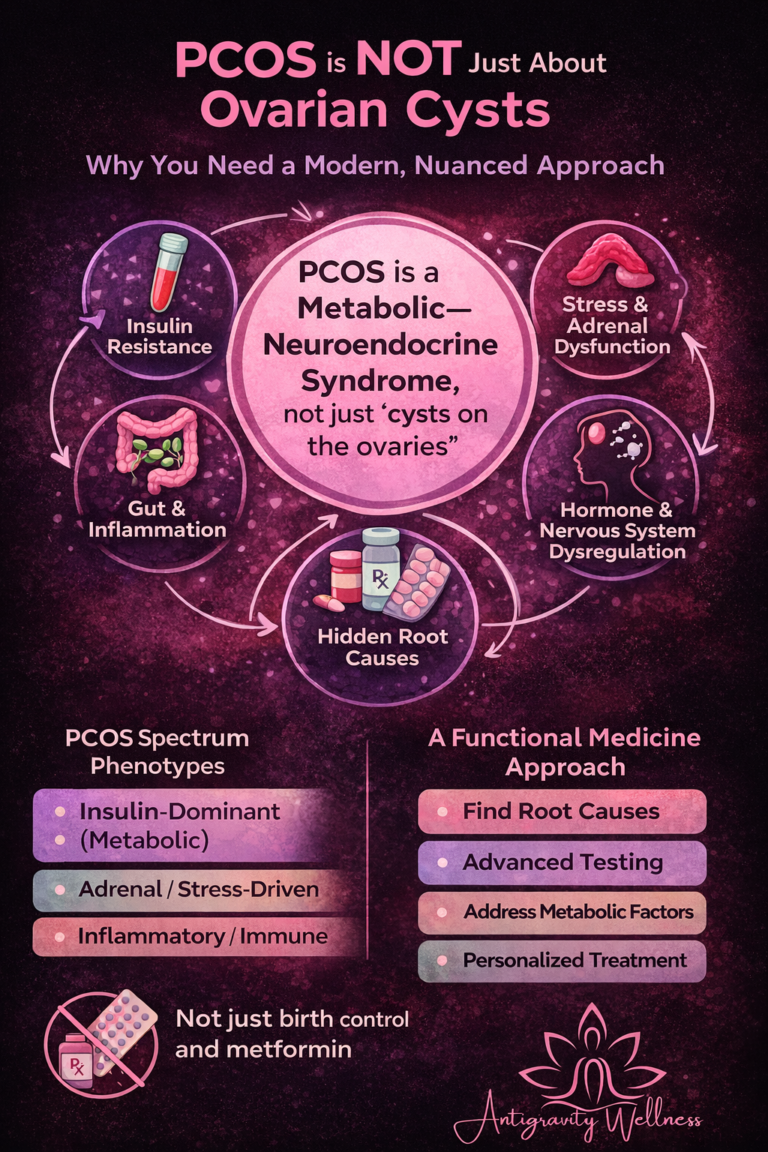
It started with Sunday mornings.
Michelle used to love slow coffee, a walk with her husband, and reading a book in her favorite chair.
But lately, Sundays felt heavy.
She couldn’t shake the sense of anxiety and dread that crept in before the week even started.
She thought maybe she was burned out from work… or maybe, she was just “losing it.”
But what she didn’t know was that her hormones — not her mindset — were shifting beneath the surface.
The Overlooked Link Between Hormones and Mental Health
During perimenopause — the 5–10 years leading up to menopause — your hormones can fluctuate wildly from one week to the next.
Estrogen and progesterone, the two hormones that used to rise and fall in predictable patterns, start to become erratic.
Here’s what that means for your brain:
🧠 Estrogen supports serotonin and dopamine — the chemicals responsible for happiness, motivation, and focus.
🩷 Progesterone supports GABA — your body’s natural tranquilizer.
⚡ Cortisol (your stress hormone) becomes more unpredictable, often staying higher longer in response to chronic stress or poor sleep.
When these hormones lose their rhythm, your brain chemistry follows suit.
That’s why so many women experience new or worsening anxiety, depression, and mood swings during perimenopause — even if they’ve “never been an anxious person” before.
And yet… this connection is often missed or dismissed in conventional medicine. Too many women are told, “It’s just stress” or “You’re getting older.”
But here’s the truth: you’re not broken — you’re in transition.
Case Study: Finding Calm Again Through Functional Care
When Michelle first came to Antigravity Wellness, she was 45, juggling a demanding job, two teenagers, and relentless mood swings.
She told me, “I wake up in the middle of the night with my heart racing. I cry over commercials. And then I feel guilty for snapping at everyone.”
Her labs revealed what her body had been trying to say all along:
Low progesterone, causing her anxiety and sleep disruption
Fluctuating estrogen, leading to irritability and emotional swings
Elevated cortisol, from chronic stress and under-recovery
Vitamin D and magnesium deficiency, both linked to low mood
We started with foundational support: blood sugar balancing, magnesium glycinate, and gentle strength training instead of high-intensity workouts.
Once her body had more stability, we introduced bioidentical progesterone and targeted adaptogens to regulate her stress response.
Within six weeks, Michelle said,
“I finally feel like myself again — like my body and mind are on the same team.”
You Deserve Answers — Not Another Dismissal
At Antigravity Wellness, we help women decode what their bodies are telling them.
We don’t write off your mood changes as “normal.” We identify what’s really happening beneath the surface.
Our functional medicine approach combines:
✅ Comprehensive hormone, thyroid, and adrenal testing
✅ Personalized nutrition, supplement, and movement plans
✅ Holistic mind-body strategies for stress regulation
✅ Optional hormone replacement therapy (HRT) where appropriate
✅ Ongoing care and accountability — so you don’t go through it alone
Whether your goal is to reduce anxiety, improve mood, or finally get restorative sleep again, there is a way forward.
Take the First Step Toward Balance
If you’re ready to find out what’s really behind your symptoms, start with our Hormone Readiness Questionnaire.
It only takes a few minutes, and it helps us determine which services or programs could be the best fit for your unique needs.
👉 Take the Readiness Questionnaire here
Once completed, our team will review your results and connect with you to discuss next steps — whether that’s a Brief Initial Consult, our Essentials Plan, or our high-touch Elite Program with Dr. Nicole Smith.
References
1. Gordon JL, Girdler SS. Hormone replacement therapy in the treatment of perimenopausal depression. Curr Psychiatry Rep. 2014;16(12):517. https://pubmed.ncbi.nlm.nih.gov/25308388/
2. Soares CN, et al. The perimenopause, depressive disorders, and hormonal variability. Psychiatric Clinics of North America. 2003;26(3):563–580. https://pubmed.ncbi.nlm.nih.gov/11276171/
3. Schmidt PJ, Rubinow DR. Sex hormones and mood in the perimenopause. Ann N Y Acad Sci. 2009;1179:70–85. https://pubmed.ncbi.nlm.nih.gov/19906233/
4. Freeman EW. Associations of depression with the transition to menopause. Menopause. 2010;17(4):823–827. https://pubmed.ncbi.nlm.nih.gov/20531231/
5. Santoro N, Epperson CN, Mathews SB. Menopausal symptoms and their management. Endocrinol Metab Clin North Am. 2015;44(3):497–515. https://pubmed.ncbi.nlm.nih.gov/26316239/
6. Halbreich U, Kahn LS. Role of estrogen in the aetiology and treatment of mood disorders. CNS Drugs. 2001;15(10):797–817. https://pubmed.ncbi.nlm.nih.gov/11602005/
Medical Disclaimer
This article is for educational purposes only and is not intended to diagnose, treat, cure, or prevent any disease.
It should not be used as a substitute for professional medical advice, diagnosis, or treatment.
Always seek the guidance of your healthcare provider before making any changes to your medications, supplements, or treatment plans.




